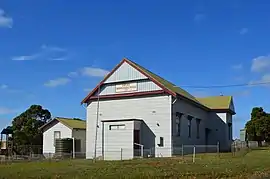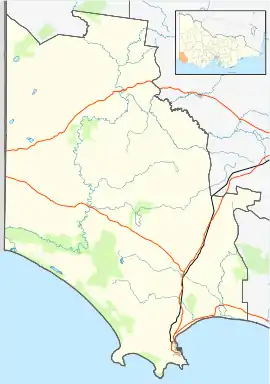Digby is a town in the Western District of Victoria, Australia. The town is in the Shire of Glenelg, 366 kilometres (227 mi) west of the state capital, Melbourne, on the Stokes River, a tributary of the Glenelg. At the 2006 census, Digby and the surrounding area had a population of 369.[2] The town is believed to be named either after Digby, Lincolnshire, in England, or in honour of a legendary early rural Australian identity, "Digby" McCabe.[3]
The Henty Brothers established the first European settlement in the Digby area in 1837. In 1843, the Woolpack Inn was established near modern Digby; it burnt down in 1887. By 1847 the town consisted of the inn, a blacksmith and a series of huts. The town was officially surveyed in 1852.[3] On 1 June 1858, Digby Post Office opened.[4] In 1857, a second inn—the Digby Hotel—was established. It still exists today, although it was rebuilt after a fire in 1935.[3]
The Digby Mechanics Institute was built in 1868 and has continually operated since. The first sitting of the Supreme Court of Victoria outside Melbourne was in Digby in 1869.[3] By 1874 the town had a post office, two hotels, four shops and a school.[3]
Traditional ownership
The formally recognised traditional owners for the area in which Digby sits are the Gunditjmara People[5] who are represented by the Gunditj Mirring Traditional Owners Aboriginal Corporation.[6]
References
- ↑ Australian Bureau of Statistics (27 June 2017). "Digby (State Suburb)". 2016 Census QuickStats. Retrieved 12 January 2021.
- ↑ Australian Bureau of Statistics (25 October 2007). "Digby (State Suburb)". 2006 Census QuickStats. Retrieved 14 November 2008.
- 1 2 3 4 5 "Digby, Victoria, Australia : Settlement & Timeline". Ballarat Genealogy. Archived from the original on 3 December 2008. Retrieved 14 November 2008.
- ↑ Phoenix Auctions History. "Post Office List". Retrieved 12 April 2021.
- ↑ "Map of formally recognised traditional owners". Aboriginal Victoria. Retrieved 2 June 2020.
- ↑ "Gunditj Mirring Traditional Owners Aboriginal". Gunditj Mirring Traditional Owners Aboriginal Corporation. Retrieved 2 June 2020.

